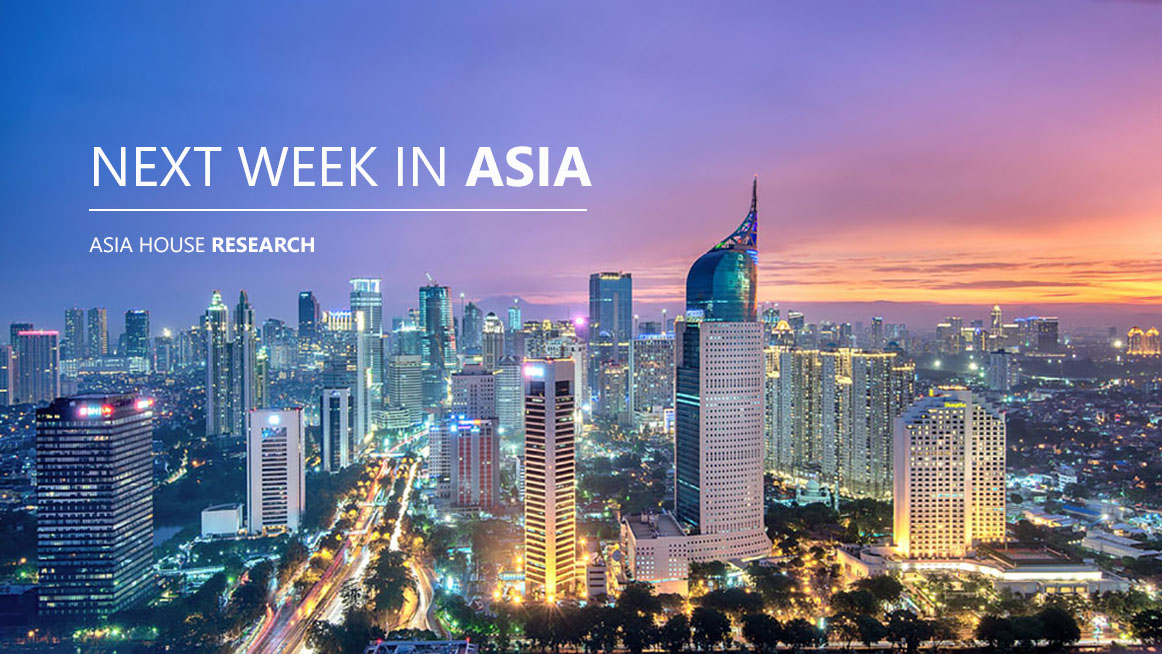Driving commercial and political engagement between Asia, the Middle East and Europe
Driving commercial and political engagement between Asia, the Middle East and Europe
Driving commercial and political engagement between Asia, the Middle East and Europe

Next Week in Asia is the Asia House weekly briefing on key trade, investment, and policy issues to watch across Asia in the week ahead, with analysis and views from our Research and Advisory team.
JOIN OUR MAILING LIST to receive Next Week in Asia direct to your inbox.
India’s upcoming trade report could show that its trade deficit has further widened, owing to the continued fallout from the COVID-19 crisis. India is at an important junction in its trading relationships, particularly with the UK where there is active discussion around expediting a free trade agreement (FTA). India’s Trade Minister Piyush Goyal has stated that negotiations on a £23 billion FTA with the UK were ‘progressing well’ and that there is an active effort to identify areas where a deal can be closed. Despite the COVID-19 pandemic, India-UK bilateral trade was at US$15.5 billion in 2020, 11 per cent higher than in 2019. A trade deal would open both India’s and the UK’s digital economies, as well as India’s pharmaceuticals, footwear and chemicals sectors – some of which are at a disadvantage in the UK market. The UK could access India’s consumer goods market, including for its scotch whisky; at 150 per cent, India’s tariffs on scotch whisky are prohibitively high.
The progress in UK-India trade talks will be discussed during an Asia House briefing with Liz Truss, Secretary of State for International Trade, on Thursday 2 September. Find out more.
The COVID-19 Delta variant is likely to continue to significantly disrupt economic activity in a number of Southeast Asian economies. Comparatively lower vaccination rates coupled with periodic waves of COVID-19 infections have led to factory shutdowns and export losses, which have in part fuelled global supply chain disruptions. A further deterioration in the upcoming raft of Asia’s purchasing managers’ indices (PMIs) is likely; PMIs tend to give a good lead indication for economic activity. There have been particularly sharp falls to outright contractionary sub-50 readings in Vietnam, the Philippines and Malaysia. It will be worth watching these economies’ readings for further weakness. This would suggest outright contraction in the ‘hard’ manufacturing output data in the summer months. Export orders will also be worth monitoring in these reports, as they could suggest that the region’s silver lining –trade – may have started to wane in the summer months.
Factory closures and supply-chain disruptions are impacting Vietnam’s economic activity. Although it has a strong and growing manufacturing base, factory closures owing to lockdown measures in its southern industrial zone have disrupted both production and exports. Its upcoming purchasing managers’ index will likely show further weakness: the index collapsed in June and has been in sub-50 contractionary territory since. Major footwear companies, such as Foot Locker and Adidas, have cited challenges. Ho Chi Minh City, Vietnam’s largest city, has been impacted particularly strongly; it imposed strict social-distancing measures including rules on worker transport and housing, and the deployment of staff on factory floors. These restrictions have impacted activity. Vietnam’s Textile and Apparel Association has voiced strong concern over the impact of COVID-19 on the country’s outlook. The risk of further supply chain disruption to Vietnam’s export outlook is particularly high given the country’s low vaccination rate. Despite lockdown measures, its COVID-19 cases continue to surge, driven by the Delta variant.
HE Nguyen Hoang Long, Vietnam’s Ambassador to the UK, will brief Asia House Corporate Members on Vietnam’s economy on Wednesday 1 September. Find out more.
There are significant downside risks to Thailand’s growth trajectory given the continued spread of the COVID-19 Delta variant. As Southeast Asia’s second-largest economy, its downside growth risks are of particular significance for the region. At 0.7 per cent, the Bank of Thailand’s new downwardly-revised growth projection for 2021 is low and significantly lower than many of Thailand’s neighbouring economies. Given the significant output gap between its actual and potential growth, there is scope for unconventional monetary measures. Ultimately, a multipronged policy is needed to address Thailand’s economic scarring from the crisis. In the absence of further measures to shore up liquidity, its twin deficits in external trade and in government spending will likely result in domestic financial volatility. Thailand’s financial markets, particularly its exchange rate, look vulnerable. Its upcoming current account data are likely to show further deterioration owing to the continued fallout from Thailand’s third COVID-19 wave.
Tensions between Saudi Arabia and Iran will be on the agenda during an upcoming regional summit convened by Iraq. Egyptian President Abdel Fattah al-Sisi and Jordan’s King Abdullah II have confirmed their attendance at Saturday’s Baghdad summit, while leaders from Iran, Saudi Arabia and Turkey have also been invited. French President Emmanuel Macron is the only official from beyond the region expected to attend. Iraq’s decision to host the forum has been seen as an attempt by Baghdad to assume a mediator role in the region, and reflects fears among Gulf states that they may no longer be able to rely on the US. The summit will aim to ease ongoing tensions between Riyadh and Tehran.
